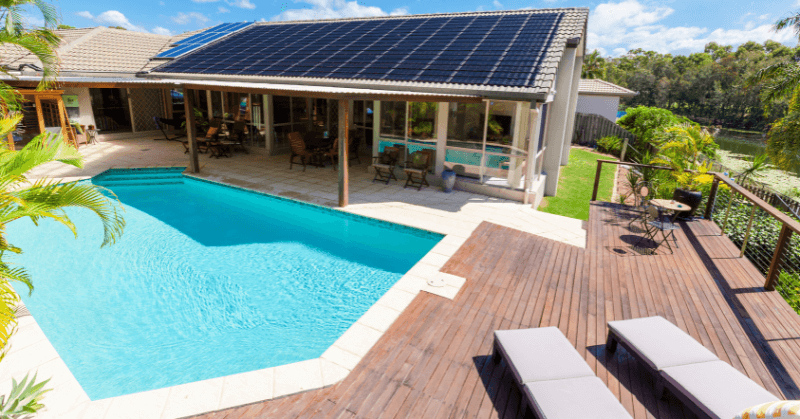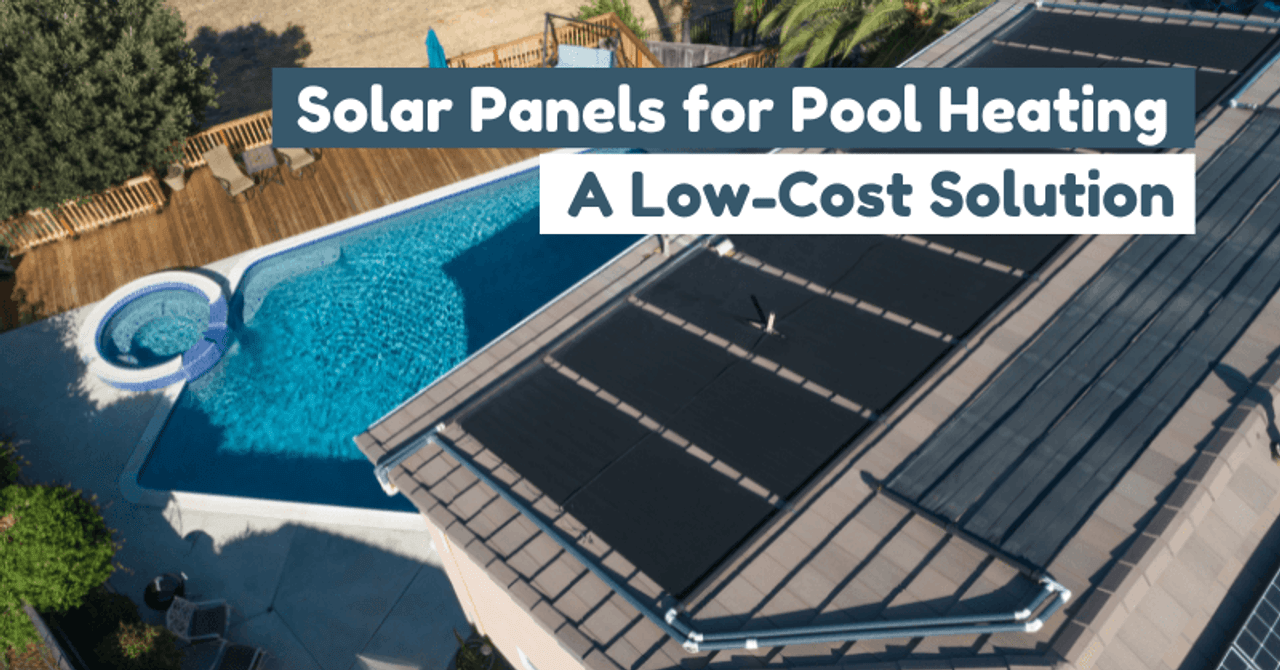Solar Panels for Pool Heating | Let’s Explore a Low-Cost Solution!
Though solar energy was first used in the 18th century, it became more popular and easily accessible to the community in the last two decades. Nowadays, solar energy has a wide range of applications, including but not limited to solar battery charging, solar for cooking, solar for industries, solar for homes, solar pumps, solar vehicles, and solar chimneys.
One popular application of solar energy is pool heating. Thousands of pool owners have shifted to solar technology to heat their pools, and many more are planning to do so. This article specifically focuses on solar panels for pool heating. It presents the type of solar panels you need to heat pools, how much they cost, and what to consider to get the maximum out of solar pool heaters.
Is it possible to heat swimming pools with solar panels?
Yes, it is very much possible to heat pools by installing a solar power system instead of using any other form of energy. The major reason pool owners shift to this technology is cost competitiveness, which we will explain in detail in the later section. The size of a solar electric system for pools depends on how big or small your pool is.
Why should you heat pools with solar panels?
As you know, pools lose heat through surface evaporation, so they must be heated whether the weather is warm or cold. When it comes to heating pools, you have different options, such as heat pumps, gas heaters, and solar panels. The question that arises here is, “Why should you choose solar panels for pool heating?” You have the same question in mind. Right?
Well, there are two main reasons why solar pool heaters should be your top priority.
- Solar pool heating solution is cost-effective compared to any other way of heating pools. They help you reduce electricity bills significantly.
- The payback period for solar pool heaters is shorter than all other pool heating techniques.

Exploring the statistics for gas and electricity shows that the prices for both are continuously increasing every other day, making solar-powered pool heating an affordable and long-lasting solution.
A solar power system can heat your pool for up to 20 years if maintained perfectly. Solar systems allow you to monitor everything automatically; therefore, you don’t need to hire a separate resource for maintenance.
Types of solar panels for heating pools
Solar modules are divided into two main categories for pool heating, as listed and explained below.
1. Glazed solar collector
This solar collector is made with different metals and other materials, including aluminum, copper, and iron-tempered glass. Due to the high prices of these materials, glazed solar collectors are costly. You can use these solar panels throughout the year. However, they perform well in cold atmospheres. These systems need less space to install.
2. Unglazed solar collector
This type of solar panel is made up of rubber or plastic. It does not use a glass to cover its surface. It is highly affordable compared to a glazed solar collector but does not perform well in cold weather. If you only use a pool when the temperature is above freezing, look no further than using an unglazed solar collector system. It will help you save a lot of money than investing in a glazed solar collector.
Note: If you want to buy budget-friendly solar panels for pool heating, always get in touch with a trusted supplier like Renogy.
How do solar panels work for pool heating?
A solar power system for pool heating is made up of different components, including a solar collector, water pump, flow control valve, and filter. A solar collector circulates the heated water.
- A pool pump passes the water through the filter to make sure all debris is removed from it.
- Then, the filtered water is passed through a flow control valve, from where the water is passed through solar collectors and heated.
- Now, the heated water is passed through the chlorination system.
- It is then sent back to the pool as warm water.
Some solar-powered pool heaters come with automatic sensors to divert water through solar collectors. It only happens when the temperature of solar collectors is several degrees higher than that of the pool.
If the temperature of the pool water and solar collectors is the same, the filtered water bypasses solar collectors and goes back to the pool. This is how solar pool heating works.
Potential benefits of solar panels for pool heating
Though solar pool heaters come with a range of advantages, a few of them are given below.
1. All-year support
With solar panels installed for pool heating, you can spend quality time in pools all year long. However, it depends on the sun exposure and the location of the pool. A solar pool heater is an ideal choice for all atmospheric conditions, be it warm, cold, or extreme cold. In addition, this technology is perfect for both commercial and residential uses.
2. Easy to install
Installing solar panels for heating pools is a super easy job. You can install them easily either on the ground or rooftop. One thing that you must ensure is that the solar power system remains exposed to sunlight for the maximum time.
3. No maintenance
A solar system for pool heating can perform its functions for up to 20 years, which means you don’t need additional efforts for maintenance. All you need to do is to clean them regularly. It will help you increase the lifespan of PV panels.
4. No extra costs
Once you install a solar power system to heat pools, you don’t need any additional amount to handle it. In fact, this technology eliminates the cost of fuel used to generate traditional electricity.
How much does a solar pool heater cost?
A solar system for pool heating can cost you between $2,500 and $10,000. Most pool owners pay around $4,000 to purchase and install an efficient solar-powered pool heater. For this price, the payback period lies between 1 and 7 years. However, it all depends on available solar resources and the cost of local fuel. Renogy offers premium-quality solar panels at reasonable prices.
Solar pool heaters last longer than their heat and gas alternatives. A couple of factors contribute to determining the exact payback period and the actual cost. Ensure to do a few things (as listed below) before you buy and install a solar system for pool heating.
- Find the correct solar system size.
- Determine the right direction and angle to install solar panels.
- Find out the solar system’s efficiency.
- Draw a system cost comparison.
- Review local regulations and codes.
Things to consider to maximize the performance of your solar pool heater
To make your solar panels for pool heating as environmentally friendly as possible and increase the system’s efficiency, always remember to consider a few things.
- Use a pool cover. Doing this will help you preserve the generated heat. Plus, it lowers the rate of evaporation. Adding a pool cover to your solar heating kit is a fundamental addition. The dark coating is always recommended because it captures more solar energy from sunlight.
- Make sure that there is no shade on the installed panels and that they are fully exposed to the sun. It will help you maximize the efficiency of your solar pool heating system.
- The recommended size of the solar pool heating system is 30% to 60% of the pool’s area or more.
Conclusion
Since solar panels have become easily accessible to all of us, a significant increase in their demand has been recorded in the past two decades. One of the popular applications of solar energy is pool heating. Glazed and unglazed solar panels are used to heat your pool water. Glazed panels are more costly than unglazed ones because they come with improved efficiency, even in cold atmospheric conditions.
A range of real-life benefits are associated with solar panels for pool heating, such as no maintenance, no extra cost, easy installation, environmental friendliness, and a decent warranty. If you want to buy good quality solar panels to heat your pool’s water, ensure to get in touch with Renogy.
FAQs
Q: How many solar panels are required to heat pools?
A: Actually, it depends on several factors, such as average temperature, pool size, and how much to heat the pool. Big pools need more solar panels. Similarly, more panels are required to heat deeper pools.
Q: Can I install solar panels for pool heating on my own?
A: It is always best to hire trained and experienced professionals to install solar systems for pool heating because it requires unique tools and specialized efforts. Therefore, installing such a system on your own can be a challenging job.
Q: How long does it take to install solar panels for pool heating?
A: It depends on the size of your pool. For most pools, it takes somewhere between one and three days to install a solar system for pool heating.
Q: Are solar pool heating systems difficult to maintain?
A: Well, maintaining a solar-powered pool heating system is far easier than gas pool heaters and heat pumps. All you need to do is to keep the solar panels clean and ensure they are fixed properly to survive in high-speed winds.











